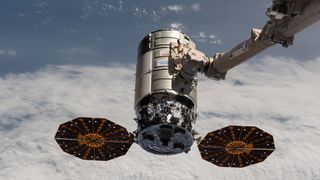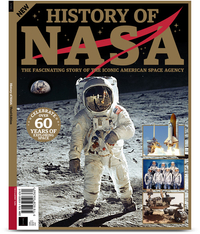Northrop Grumman to launch next Cygnus cargo ship for NASA on Feb. 20
Liftoff is set for 12:36 p.m. EST (1736 GMT).

Experiments with worms and artificial retinas will ship to space Feb. 20 aboard a Northrop Grumman Cygnus spacecraft, according to a NASA announcement.
The cargo ship is scheduled to lift off no earlier than 12:36 p.m. EST (1736 GMT) from NASA's Wallops Flight Facility in Virginia, if all goes to plan. Only a limited number of U.S. media may go on site due to quarantine protocols associated with the novel coronavirus pandemic.
Cygnus will launch to the International Space Station aboard an Antares rocket and arrive at the orbiting lab two days later, according to NASA.
Video: Watch Northrop Grumman's NG-14 cargo ship launch!
Some of the research investigations on board Cygnus include an experiment to study muscle strength in worms, an experiment concerning how microgravity may assist with artificial retina production, and the SpaceBorne Computer-2 experiment from Hewlett Packard Enterprise.
SpaceBorne Computer-2 "aims to demonstrate that current Earth-based data processing of space station experimental data can be performed in orbit," NASA said in the same statement. In general, processing data in space may reduce the amount of data sent to the ground, freeing communications channels for other tasks.
Cargo ships also carry essential items for spaceflyers including fresh food, equipment replacements or other items the crews may need to live in space for months at a time. After a few months, the crew fills departing Cygnus cargo ships with trash, which will burn up when the spacecraft re-enters the atmosphere.
Get the Space.com Newsletter
Breaking space news, the latest updates on rocket launches, skywatching events and more!
History of NASA: $22.99 at Magazines Direct
Discover the story of how and why NASA was created, its greatest triumphs, darkest days, and of the times it exceeded all possible hopes. A tale of adventure, heroism and resourcefulness, learn of the space agency's greatest achievements and how — over six decades — the organization has consistently and tirelessly devoted itself to its founding principle: that "activities in space should be devoted to peaceful purposes for the benefit of all humankind".
When the last Cygnus spacecraft left the space station in January, it carried a high-speed 5G communications experiment along with the latest iteration in a series of science experiments investigating the behavior of fire in space, called Saffire-V. NASA plans to use these fire studies to improve astronaut safety on future missions, especially those in deep space.
Follow Elizabeth Howell on Twitter @howellspace. Follow us on Twitter @Spacedotcom and on Facebook.
Join our Space Forums to keep talking space on the latest missions, night sky and more! And if you have a news tip, correction or comment, let us know at: community@space.com.

Elizabeth Howell (she/her), Ph.D., is a staff writer in the spaceflight channel since 2022 covering diversity, education and gaming as well. She was contributing writer for Space.com for 10 years before joining full-time. Elizabeth's reporting includes multiple exclusives with the White House and Office of the Vice-President of the United States, an exclusive conversation with aspiring space tourist (and NSYNC bassist) Lance Bass, speaking several times with the International Space Station, witnessing five human spaceflight launches on two continents, flying parabolic, working inside a spacesuit, and participating in a simulated Mars mission. Her latest book, "Why Am I Taller?", is co-written with astronaut Dave Williams. Elizabeth holds a Ph.D. and M.Sc. in Space Studies from the University of North Dakota, a Bachelor of Journalism from Canada's Carleton University and a Bachelor of History from Canada's Athabasca University. Elizabeth is also a post-secondary instructor in communications and science at several institutions since 2015; her experience includes developing and teaching an astronomy course at Canada's Algonquin College (with Indigenous content as well) to more than 1,000 students since 2020. Elizabeth first got interested in space after watching the movie Apollo 13 in 1996, and still wants to be an astronaut someday. Mastodon: https://qoto.org/@howellspace

